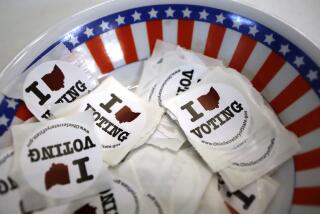Law Protects People With AIDS Virus, Justices Say
WASHINGTON — The estimated 1 million Americans infected with the virus that causes AIDS are protected from discrimination at work, in medical care, housing and their use of public services, the Supreme Court ruled Thursday.
On a 5-4 vote, the high court broadly interpreted the Americans With Disabilities Act of 1990 to cover not just individuals who are incapacitated by a disease but also all those whose lives are substantially affected because of their medical condition.
The ruling appears to extend the law’s anti-bias protection to millions of others who have potentially disabling diseases such as epilepsy, cancer, heart disease and diabetes.
Congress passed the law to forbid discrimination against those who are qualified to work but were not hired or promoted because of disability or disease. The measure also gives people with disabilities the right to equal treatment in hotels, restaurants, doctor’s offices and other public businesses.
But until Thursday, it had been unclear whether the word “disability” in the law should be read narrowly, to cover only those unable to function, or broadly, to cover those whose condition might substantially interfere with their lives.
The issue came before the court in a test case brought by a Maine woman whose dentist refused to treat her in his office because she was infected with HIV. Because the woman, Sidney Abbott, did not have AIDS or any of its symptoms, she was not disabled and not entitled to the law’s protection, the dentist, Randon Bragdon, maintained.
He said that he would treat her but only in a hospital that was two hours away by car.
The court took up the case (Bragdon vs. Abbott, 97-156) to decide the far-reaching question of whether a person with HIV but no other symptoms of AIDS has a disability.
“We hold [that HIV] is an impairment from the moment of infection,” said Justice Anthony M. Kennedy for the court. Moreover, HIV has a “profound impact on almost every phase of the infected person’s life,” he commented.
Noting that Abbott said she had refrained from having children because of the fear that she would pass on the infection, Kennedy said that she had been deprived of a “major life activity.”
The law defines a disability as a “physical or mental impairment that substantially limits one or more of the major life activities.”
“Reproduction and the sexual dynamics surrounding it are central to the life process itself,” the justice said.
In his comments from the bench Thursday and in several sections of his opinion, Kennedy emphasized that the law should be read generously.
“The act addresses substantial limitations on major life activities, not utter inabilities,” he said. “The definition [of a disability] is met even if the difficulties are not insurmountable.”
Gay rights activists and advocates for the disabled were elated by the ruling. In recent years, many judges have read the law so narrowly that it protected only those who were virtually crippled by their disabilities.
“This is an enormous victory for the legal rights of people living with HIV,” said Boston attorney Bennett H. Klein, who represented Abbott. “The U.S. Supreme Court has sent a clear message that Americans living with HIV cannot be denied jobs, housing or health care based on unwarranted prejudice.”
Matt Coles, director of the AIDS Project for the American Civil Liberties Union, called it significant that the court rejected the “cramped, hypertechnical approach” taken recently by many judges. They have denied claims filed by people with cancer or HIV who could not prove that they were physically disabled, he said.
“In its tone and its approach, this decision goes back to basics and says the law should be interpreted in accord with its broad fundamental purpose,” Coles said.
No one doubts that Congress intended to protect all people with HIV, he said, adding that “its reasoning would also seem to cover someone with cancer or heart disease as well.”
In its regulations, the government has said the disabilities law covers a broad array of impairments, including “such diseases and conditions . . . as cerebral palsy, epilepsy, muscular dystrophy, multiple sclerosis, cancer, heart disease, diabetes, mental retardation [and] emotional illness.”
While courts are free to disagree with the government’s interpretation of the law, Kennedy quoted from the regulations and said that the government’s “views are entitled to deference.”
For the second time in three years, Kennedy has emerged as a hero among gay-rights advocates. It is not a role many might have predicted for the conservative-leaning judge who was appointed by President Reagan.
Two years ago, he authored the court’s first major decision protecting gays and lesbians from discrimination. His opinion struck down a Colorado voter initiative that stripped gays and lesbians of all legal protection against discrimination.
In Thursday’s decision, Kennedy spoke for a liberal-leaning coalition that included Justices John Paul Stevens, David H. Souter, Ruth Bader Ginsburg and Stephen G. Breyer.
The four dissenters said the law should be strictly interpreted based on its wording. And by that standard, Abbott had not shown that she had a disability.
“In my view, [she] has failed to demonstrate that any of her major life activities were substantially limited by her HIV infection,” said Chief Justice William H. Rehnquist. He was joined by Justices Sandra Day O’Connor, Antonin Scalia and Clarence Thomas.
The court did not hand down a final decision on one issue in the case concerning the dentist and his treatment policy.
The disabilities law says that dentists, doctors and other business people may refuse to serve a person with a disability if doing so “poses a direct threat to the health or safety of others.”
Bragdon maintained that his health would be endangered if he were forced to fill Abbott’s cavity in his dental office.
A federal judge in Maine, and the U.S. court of appeals in Boston, disagreed. They cited medical studies and government reports concluding that Bragdon’s risk of contracting the disease was essentially nonexistent if he took standard precautions.
Kennedy’s opinion largely endorsed that conclusion.
The dentist “receives no special deference simply because he is a health care professional,” he wrote. Bragdon has “failed to present any objective, medical evidence showing that treating [Abbott] in a hospital would be safer or more efficient in preventing HIV transmission than treatment in a well-equipped dental office.”
Nonetheless, the high court did not have the time to fully examine the risks, if any, to a dentist, he concluded. In 1994, the Centers for Disease Control and Prevention identified seven dental workers who may have contracted the HIV virus through their work, although none of those infections was proved to have resulted from exposure to patients.
Because of that uncertainty, the court sent the case back to the judges in Boston to allow a “full exploration of the issue” by the competing sides.
“A resolution of the issue will be of importance to health care workers,” he said. “We do not foreclose the possibility that the court of appeals will reach the same conclusion as it did earlier.”
More to Read
Get the L.A. Times Politics newsletter
Deeply reported insights into legislation, politics and policy from Sacramento, Washington and beyond. In your inbox three times per week.
You may occasionally receive promotional content from the Los Angeles Times.











